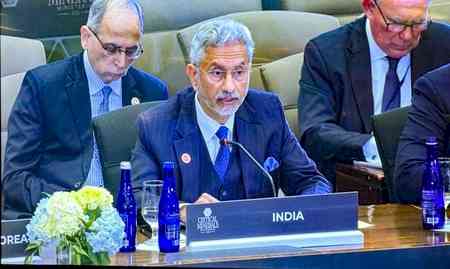Munir among Pakistan's most unpopular Army Chiefs, lacks legitimacy: Report
Pakistan's Army Chief Asim Munir has emerged as one of the most unpopular military rulers in the country’s recent history, presiding over a fractured economy, restricted media, and a deeply polarised nation, a report detailed on Tuesday.

Islamabad, Oct 14 (IANS) Pakistan's Army Chief Asim Munir has emerged as one of the most unpopular military rulers in the country’s recent history, presiding over a fractured economy, restricted media, and a deeply polarised nation, a report detailed on Tuesday.
It added that Munir’s problem is not control but lack of legitimacy. Unlike his predecessors, who sought civilian applause, his "politics" too is stripped of sentiment.
"Pakistan stands today at a crossroads where its military ruler, Field Marshal Asim Munir, appears to have chosen the oldest and deadliest game in the country’s playbook: the politics of division. Having run out of foreign enemies to exploit and with his legitimacy increasingly fragile at home, Munir seems to have turned inward, weaponising ethnicity and regional identity to sustain control," a report in Pakistani news web portal ‘Global Village Space’ detailed.
“The latest official rhetoric from the military establishment paints Pashtuns, Afghans, and the people of Khyber Pakhtunkhwa (KP) as the problem, conveniently linking them with ‘Talibanisation’ and internal insecurity. The country’s most powerful man is recasting a domestic political crisis as an ethnic and security one, dividing Pakistanis to justify further militarisation of national life,” it added.
According to the report, Munir’s position is particularly perilous because he has fused political control with institutional obedience. The judiciary, it said, once a potential check, is now rendered powerless, with judges who dare question military overreach facing transfer, resignation, or silent exile. Additionally, the police and intelligence agencies have been transformed into instruments of political suppression, arresting activists, censoring journalists, and silencing dissent under the pretext of national security.
“The 2024 elections, marred by blatant rigging, symbolised the death of electoral legitimacy. A government propped up by the barracks can neither deliver policy nor claim a popular mandate. Instead, it governs through decrees and arrests. The media, meanwhile, survives by self-censorship; its journalists whisper what they once shouted,” the report stated.
It stressed that the Field Marshal’s propaganda may hold the narrative, but internal divisions in Pakistan are widening. From Balochistan to the tribal districts, resentment runs high. The report asserted that protests in Pakistan-occupied Gilgit-Baltistan, strikes in Pakistan-occupied Kashmir, and rising unemployment across Punjab province exposed a society fraying under economic strain.
“The myth of Pakistan as a ‘fortress of Islam’ no longer inspires; hunger and hopelessness have replaced it. The growing sense of alienation, especially among the youth, is a time bomb ticking beneath the surface. If every dissenting voice is branded anti-state, then one day, the state will find itself without any citizens left to defend it,” the report noted
--IANS
scor/as



 IANS
IANS 










